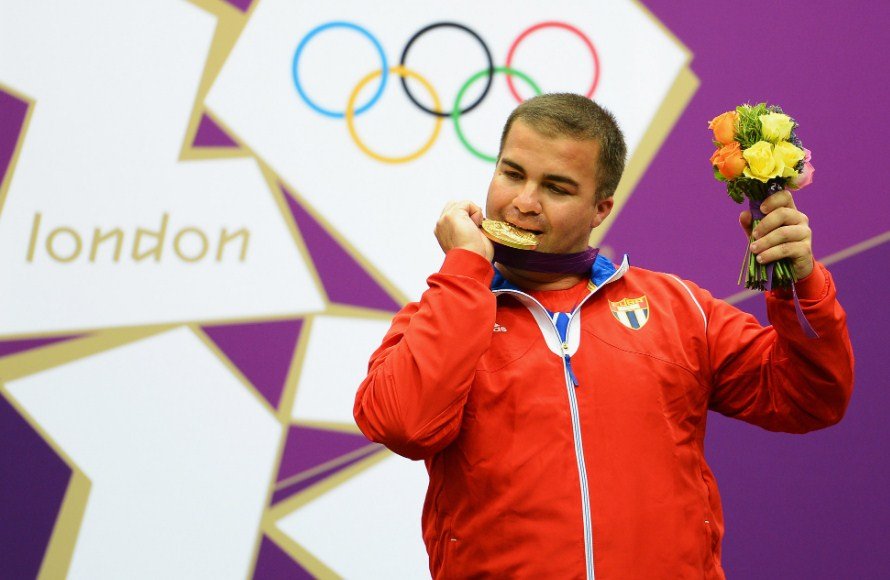A desperate move to survive the economic crisis
Cuban athletes Leuris Pupo and Ivan Pedroso have sold their Olympic medals for over $70,000 each in a US auction. The news shocked the sports world and raised questions about the plight of Cuban Olympians in the midst of a severe economic crisis.
Pupo, a shooter, won the gold medal in the 25-meter rapid fire pistol event at the 2012 London Games. Pedroso, a long jumper, won the gold medal at the 2000 Sydney Games. Both of them are considered among the best in their disciplines and have brought glory to their country.
However, their medals ended up in the hands of collectors who paid a hefty price for them. According to the RR Auction company, which organized the event, Pupo’s medal sold for $73,205 and Pedroso’s medal sold for $71,335. The auction also included a bronze medal from the 1896 Athens Olympics and torches from the 1980 and 1988 winter Olympics.
The company did not reveal the identity of the consignee, but said that they were a long-time Olympic collector who decided to sell the medals. They also said that they did not foresee any problems arising from the sale, despite the possible legal and ethical implications.
The reasons behind the sale
Neither Pupo nor Pedroso have spoken publicly about the sale of their medals, nor has the Cuban Institute of Sports and Recreation (INDER). However, some sources have suggested that the athletes had already sold their medals a long time ago to collectors, who then put them up for auction.
The reasons for the original sale are not clear, but they could be related to the economic difficulties that many Cubans face. The island nation has been suffering from a deep recession, aggravated by the COVID-19 pandemic, the US sanctions, and the decline of its allies. The average monthly salary in Cuba is around $40, and many basic goods are scarce or expensive.
Cuban athletes are not exempt from these hardships. Although they receive some benefits from the state, such as housing, education, health care, and pensions, they often struggle to make ends meet. Many of them have left the country in search of better opportunities, while others have resorted to selling their belongings or working in other sectors.
According to the authorities, between 2022 and so far in 2023, a total of 187 athletes left the island, 33 of them were among the candidates for medals in the upcoming Games in Santiago, Chile. Some of them have joined professional leagues or teams in other countries, while others have sought asylum or citizenship elsewhere.
The impact on Cuban sports
The sale of Olympic medals by Cuban athletes is not a new phenomenon. In 2016, discus thrower Yarelis Barrios had to return her silver medal from the 2008 Beijing Games after testing positive for doping in a reanalysis of her sample. However, she could not do so, because she had already auctioned off her medal on eBay.
These cases reflect the decline of Cuban sports, which used to be a source of pride and prestige for the nation. Since the triumph of the revolution in 1959, Cuba invested heavily in sports development, creating a system that identified and trained talented athletes from an early age. Cuba also diversified its participation in different sports, winning medals in 25 disciplines.
As a result, Cuba became a sports powerhouse, especially in the Olympic Games. Cuba has won a total of 226 Olympic medals, ranking 18th in the all-time medal table. Its best performance was in the 1992 Barcelona Games, where it finished fifth in the medal count, ahead of countries like China, France, and Great Britain.
However, after the collapse of the Soviet Union, Cuba’s main ally and benefactor, Cuba entered a period of economic crisis that affected all sectors of society, including sports. Cuba’s performance in the Olympic Games declined, reaching its lowest point in the 2008 Beijing Games, where it finished 28th in the medal count.
Cuba has tried to recover its sports glory, but it faces many challenges, such as the lack of resources, the migration of athletes, the competition from other countries, and the impact of the pandemic. Cuba hopes to win at least 15 medals in the next Pan American Games in Chile, but it is uncertain if it will be able to achieve that goal.
The value of Olympic medals
The sale of Olympic medals by Cuban athletes also raises the question of the value of these symbols of athletic excellence. For some, they are priceless, representing years of sacrifice, dedication, and passion. For others, they are commodities, subject to the laws of supply and demand.
The value of Olympic medals depends on many factors, such as the rarity, the condition, the sport, the event, the athlete, and the market. According to experts, the most valuable medals are those from the early editions of the Games, those from popular sports such as athletics and swimming, those from memorable events such as world records or historic feats, and those from famous athletes such as Jesse Owens or Michael Phelps.
The value of Olympic medals also varies depending on the buyer. For some collectors, they are objects of admiration and curiosity, reflecting the history and culture of the Games. For some fans, they are souvenirs and memorabilia, expressing their admiration and support for their favorite athletes. For some investors, they are assets and opportunities, expecting to profit from their resale or appreciation.
The value of Olympic medals is not only monetary, but also emotional and symbolic. For many athletes, they are the culmination of their dreams and careers, the recognition of their talent and effort, and the legacy of their contribution to their sport and their country. For many countries, they are the expression of their identity and pride, the demonstration of their potential and achievement, and the inspiration for their future generations.

